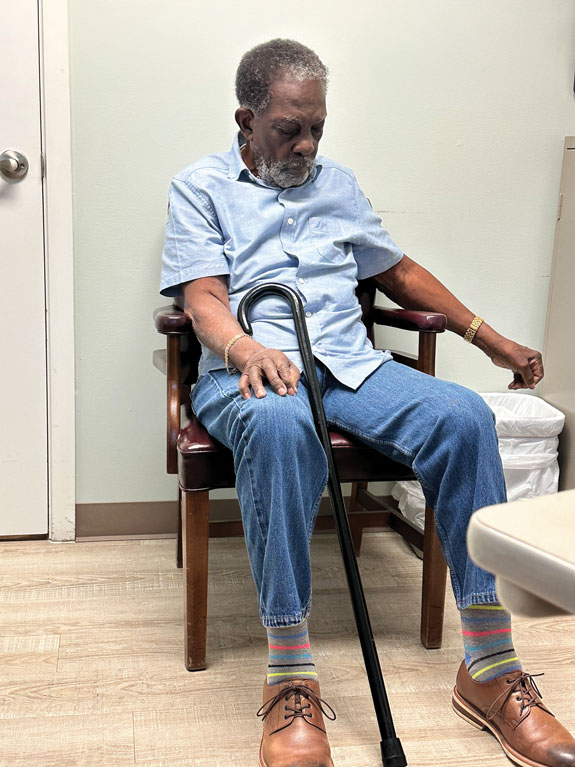A friend, who is also a caregiver, texted me one evening to share that she felt like she was missing out on many things due to her new caregiving responsibilities. I immediately called to encourage her because the feelings she described were all too familiar. When she answered the phone, her voice started quavering as tears formed and flowed. I let her get out a good cry as I shared some things that helped me reduce the feelings of loneliness, isolation, and FOMO (fear of missing out).
We must remember that those being cared for also experience loneliness and isolation, perhaps even more severely. Friends and family often stop visiting and communicating because it’s hard to see their loved one in an infirm condition, or perhaps life just gets busy. Whatever the reason, it often yields the same result: loneliness and isolation.
There are a few faithful friends and family members who make an effort to visit my parents, who both live with dementia). For instance, if too much time has gone between visits from my Uncle Ben, daddy asks me, “I wonder what ole’ Ben is up to! I hadn’t heard from that joker in a while!” That’s when I call Uncle Ben or text his daughter. The short phone call and visits from Uncle Ben and Uncle Winnie always lift daddy’s spirits.
AN EPIDEMIC

In 2023, the surgeon general issued an advisory on the epidemic of loneliness and isolation. These issues can lead to physical ailments, like obesity, stroke, diabetes and depression, or increase their severity and decrease a person’s longevity. According to the advisory, loneliness and isolation also burden society by increasing Medicare costs and demands on the medical system.
My parents’ loneliness and isolation have become a big concern lately because daddy has been directly telling us about his feelings. Additionally, I’ve been noticing restlessness in both momma and daddy as they’ve been separated due to momma’s hospital stay and subsequent stay in a rehabilitation facility. Each time daddy visited, the excitement was evident in his gait and on his face, as well as the blush on momma’s normally stoic face — especially when he leaned forward to kiss her and tap her on her face.
After the greetings, daddy often shared how lonely he’d been without her. I knew it because during the second night of her hospital stay, I watched him through the camera app walk from room to room looking for her. He also had trouble sleeping while she was away. As I did that night and the next few nights, I either called him to reassure him that momma was fine and that my husband and I were close by, or I went to sit with him a bit.
After taking daddy to visit momma on the first day of her rehabilitation facility stay, I decided to bring him back to our house. While eating dinner, he became engrossed in the movie my husband was watching. He didn’t even challenge me when I suggested that he stay the night.
The engagement and company seemed to decrease daddy’s feelings of loneliness and isolation. To help with momma’s, I spent most of each day with her during the hospital stay and encouraged visits from family and friends.
The journey can be lonely for all involved, but here are some tips that can help:
FOR THE CAREGIVER
- Remember the importance of self-care and be committed to it. Schedule and take a nap with your phone on “Do not disturb.” Order takeout instead of cooking, or let someone bring a meal. Schedule a spa day and don’t feel guilty about it, or go to the coffee shop to sit and enjoy a cup of coffee alone or with a friend.
- Develop and/or engage your care team. Create a schedule for the team to reduce the burden resting on one person; phone a friend or family member who has offered to assist, and allow that person to do so, or alert him or her that you will be unavailable for a designated time.
- Continue membership in professional, civic, community and social organizations and attend some events.
- Know that some things will happen whether you are there or not. Don’t let the unknown or the “what-ifs” stress you out or keep you from taking respite.
FOR THE CARE RECIPIENT
- Engage in activities that he or she used to enjoy and introduce new ones. Make sure family and friends know that visitors are welcome and when.
- Whenever possible, take him or her to events to socialize.
- Spend time sitting and talking with him or her outside of caregiving responsibilities.
- Ask the care recipient to do something for you to show that he or she is still needed and valued. I sometimes ask daddy to fix something or ask momma for cooking help.
- Encourage him or her to call friends and family.



